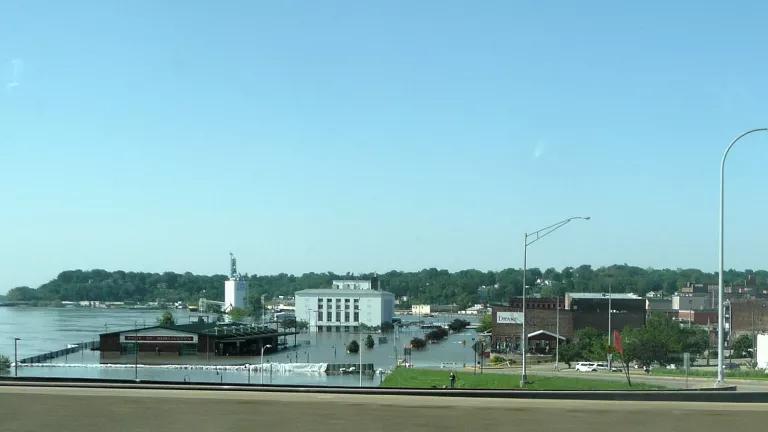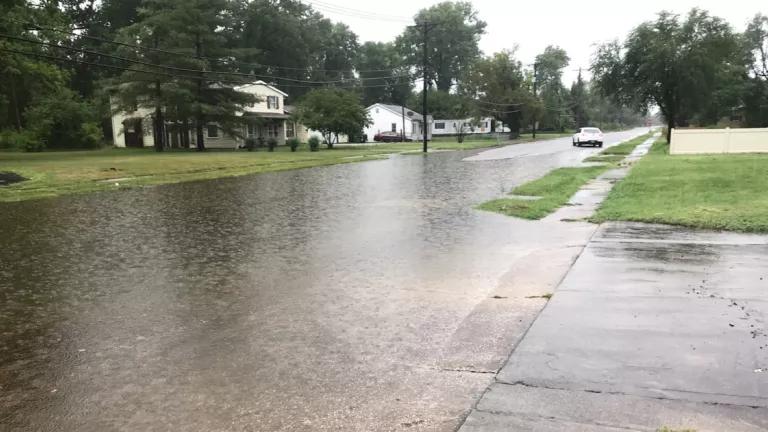Unprecedented Rain Highlights Deep Inequities in Centreville
Immediate and comprehensive action must be taken by government at all levels to address the flooding and sewage crises.

Flooding in Centreville, Illinois on July 26, 2022
This blog post was written collaboratively with legal advocates from Equity Legal Services, the Metro St. Louis Equal Housing & Opportunity Council.
The unprecedented flooding experienced in the Metro St. Louis region this week hit the majority-Black neighborhoods in north Centreville, Illinois especially hard. These residents, like so many on both sides of the Mississippi River, were forced to watch as floodwaters engulfed their streets and yards and even rushed into their houses. Some were forced to leave their homes and stay with relatives, while others sought evacuation sites to avoid the life-threatening flash floods and the risk of being trapped in their homes for days if the floodwaters did not retreat. Those who stayed watched as water smelling of raw sewage invaded in their homes.

Map of the Piat Place and Parkside neighborhoods impacted by the July 26 rainstorm
Even as many other area residents emerged in the days to follow to see receding floodwaters, residents in these Centreville neighborhoods are still facing high levels of water in their streets and homes. There is also evidence that the floodwaters have infiltrated the sanitary sewer system and could lead to sewage backups inside homes or onto lawns.

Floodwaters had not receded on 73rd St in Centreville as of July 27

A flooded manhole on 62nd St. provides evidence of stormwater infiltration into sanitary sewage system
While an abnormal amount of rain fell on Cahokia Heights, Illinois (the city created by the merger of Centreville with nearby Cahokia and Alorton in 2021), the harrowing experience of being trapped by floodwaters is all too familiar for many Centreville residents and is further magnified by the failing sanitary sewer system in their community. For years residents have spoken up about the flooding and sewage backup problems they experience as a result of decades of neglect and structural racism. The continuous flooding has crumbled foundations, distorted floorboards, doorframes and walls, destroyed furniture, furnaces, and irreplaceable photographs, led to black mold infestations, and placed other countless indignities on the lives of everyday Centreville residents. On top of the flooding, many residents must watch and smell the untreated sewage in the water flooding their homes and sitting on their yards, often for days.

Newspapers used to clean up floodwater smelling of sewage inside a home
Residents have continually called on decisionmakers across all levels of government to work with them to identify immediate investments into the deteriorating infrastructure and address the decades of harm they have experienced. They have also demanded longer-term infrastructure fixes and changes in governance and accountability structures in order to reverse the systematic racism perpetuating these crises.
A failure across all levels of government has resulted in Piat Place and Parkside experiencing exceptional levels of flooding with essentially every rainstorm, along with standing water and sewage backups even in dry weather. There are decades of infrastructure improvements projects and standard maintenance that have gone unfunded and ignored for decades by local, state, and federal decisionmakers. Even now, while there are growing commitments to invest new resources in Centreville, residents often remain in the dark about the specific solutions being developed. Moreover, the political will to make sure all regional contributions to the flooding and sewage crises are recognized and new lines of responsibility are established to permanently fix these issues seems lacking.

Indoor flooding inside a Centreville residents' home
The catastrophic flooding and sewage issues from this week should be a wake-up call that action needs to be taken to protect and the improve the lives of those most vulnerable to natural disasters and our country’s infrastructure failures and inequities. All options must be on the table, from a full assessment of the root causes of the flooding such as highways disrupting stormwater flow and inadequate stormwater management on the bluffs next to Centreville and other similar “bottoms” communities, accountability for local governments and utilities that fail to take the necessary and meaningful actions to protect their constituents and customers, and funding to compensate residents for the damage done to their homes and the disruption to their lives.
And the residents of Centreville deserve a say in which solutions are prioritized and given funding and to have their voices finally heard and listened to. Centreville residents understand these problems intimately—they are the ones who experience the flooding and sewage backups almost every time there’s a rainstorm. They also are key to developing the long-term and sustainable solutions. If those in power would have collaborated with the community years ago when these issues first came to light, a crisis of this magnitude might have been avoided in the first place.

View of the flooding from a Centreville residents' home on July 26, 2022
While we can’t change the past, we can take meaningful action toward the future. We hope these flooding and accompanying sewage tragedies spur meaningful commitments across federal, state, and local agencies to hear from and work with the Centreville Citizens for Change toward a healthy and just future.
To find out how you can support the Centreville Citizens for Change, check out the material on their website, Flooded and Forgotten.
This blog provides general information, not legal advice. If you need legal help, please consult a lawyer in your state.


